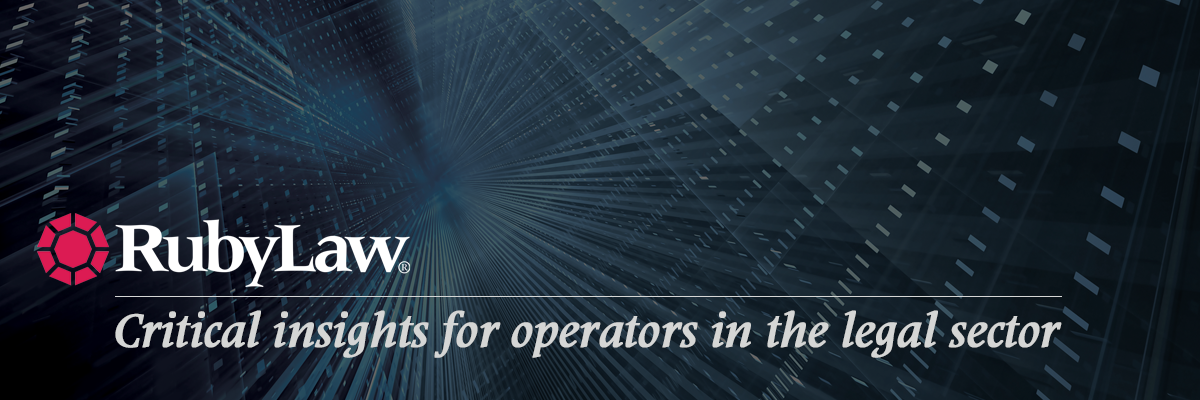Website Accessibility: Firms Failing to Implement WCAG Are Costing Themselves More Than Their Reputations
Pre-2020, website accessibility was, at best, “nice-to-have.” Today, it’s table stakes. In fact, 100% of RubyLaw-powered sites launched since 2020 have adhered to the latest Web Content Accessibility Guidelines (WCAG) standards, with current initiatives already following WCAG 3, the protocols of the Silver Task Force. If “WCAG” is unfamiliar, here’s a quick primer.
What is WCAG?
Starting in 1990 with the passage of the Americans with Disabilities Act (ADA), a civil rights law that prohibits discrimination based on disability, progress has continued and, more recently, accelerated. Specific to the web, the World Wide Web Consortium (W3C) has created standards known as Web Content Accessibility Guidelines (WCAG), which define protocols and set parameters for compliance to ensure a more equitable digital experience for all web visitors. These standards, developed by W3C’s Accessibility Guidelines Working Group, are intended to improve accessibility guidance for three major groups: users with cognitive or learning disabilities, users with low vision, and users with disabilities on mobile devices.
Why is WCAG important?
Beyond civil rights implications, the business case for WCAG in legal marketing is compelling and multi-pronged.
For many law firms, people of varying abilities are potential clients; thus, failing to provide an accessible web experience for these visitors means missing out on new business opportunities. If exclusion based on the technical capabilities of your website isn’t enough, for firms with active practices catering to the disabled, a failure to lead by example can result in additional lost business or tarnished reputations (i.e., by not practicing what you preach).
Equally, for law firms pursuing government or corporate contracts, RFPs frequently require some measure of WCAG compliance to compete. Again, a failure to adhere to WCAG means lost revenue and the possibility of falling behind the competition.
A failure to comply with WCAG can cost more than opportunity, too. It can mean being the target of lawsuits, which, while law firms are well prepared to fight, they’re rarely seeking to represent themselves in court, at their own expense, and with financial penalties at risk in the event of a loss or settlement.
“Federal courts across the country have been flooded with well over 8,000 digital accessibility lawsuits filed or removed between 2017 and 2020,” according to the American Bar Association. Let’s not forget, and this especially applies to the pizza fans among us, that the Supreme Court sided with a blind man, who sued Domino’s over site accessibility.
It’s apparent that WCAG is important. So, why might some firms struggle with web accessibility compliance?
What’s challenging about WCAG?
Let’s compare it to getting home at the end of the night. Taking a car service as opposed to hopping the subway means taking a safer, quicker option. So why isn’t everyone taking the proverbial “late night car” that is WCAG?
The reasons are numerous, and, just like taking the subway, it can be cheaper instead of taking the car. Ensuring your firm’s website meets WCAG standards can be costly and time-consuming to implement, especially if you’re not starting from scratch. Moreover, it requires web accessibility expertise from your website provider and your internal team to a lesser extent.
Your internal team, too, must have the bandwidth to support accessibility content on an ongoing basis. For instance, if you show video content with audio on your website, you’ll want closed captioning and transcription available for every video. For firms producing high volumes of video, this can require a dedicated resource or a budget to support the ongoing effort.
Finally, it typically requires a modern Content Management System, like RubyLaw Content, to support the latest in accessibility. This ingredient (i.e., modern technology supporting WCAG) is the best way to minimize related accessibility issues, while balancing the most holistic, inclusive, and accessible experience without compromising delivery.
The upside of WCAG
For firms taking WCAG seriously, the benefits are numerous—and they’re not just counterpoints to the aforementioned risks and challenges. Reducing the risk of lawsuits and making a more accessible experience will better preserve firms’ bottom lines, possibly improve top lines, and prevent reputational damage.
Having a differentiated, accessible web experience can be a competitive advantage among your peers. One example from clients of RubyLaw includes Seyfarth, a best-in-class Am Law-ranked firm. Seyfarth has dedicated practitioners with expertise on the legal obligations of places regarding public accommodation, recipients of federal assistance, government contractors, and housing providers. They are provided to individuals with disabilities under Title III of the Americans with Disabilities Act (ADA), Section 504 of the Rehabilitation Act, the Fair Housing Act (FHA), and various state non-discrimination statutes.
During the relaunch of Seyfarth.com on RubyLaw, we worked closely with their specialists to ensure that the new RubyLaw-powered website was an authentic expression of the Seyfarth brand and complied with WCAG. As the team at Seyfarth knows, the investment in WCAG—including proper technical SEO, transcription, and other means for supporting accessibility—pays further dividends with improved search rankings.
As a marketing professional , you’re falling short of table stakes if you’re not accounting for WCAG. In fact, you might not even get a seat at the table.
If you’re interested in learning more about WCAG, feel free to peruse some of our past publications on the topic or contact us directly.
—ADA, WCAG, and Website Compliance: High Stakes or Table Stakes?
—WCAG 3.0 is coming!
—Web Accessibility: The Benefits & Consequences of Compliance
References
Higgins, Tucker. “Supreme Court hands victory to blind man who sued Domino’s over site accessibility.” CNBC.com, 7 Oct. 2019, https://www.cnbc.com/2019/10/07/dominos-supreme-court.html.
(WAI), W3C Web Accessibility Initiative. “WCAG 3 Introduction.” Web Accessibility Initiative (WAI), https://www.w3.org/WAI/standards-guidelines/wcag/wcag3-intro/#wcag-3-name-formerly-silver-project.
(WAI), W3C Web Accessibility Initiative. “Web Content Accessibility Guidelines (WCAG) Overview.” Web Accessibility Initiative (WAI), https://www.w3.org/WAI/standards-guidelines/wcag/.
Vu, Minh, et al. “The Law on Website and Mobile Accessibility Continues to Grow at a Glacial Pace Even as Lawsuit Numbers Reach All-Time Highs.” Americanbar.org, 1 Jan. 2022, https://www.americanbar.org/groups/law_practice/publications/law_practice_magazine/2022/jf22/vu-launey-egan/.
“The World Wide Web Consortium.” W3C, https://www.w3.org/.







